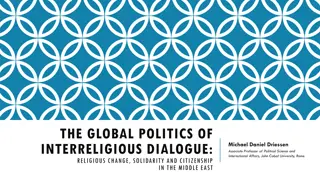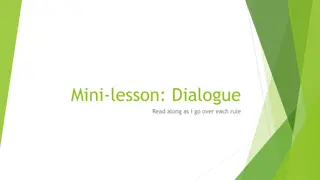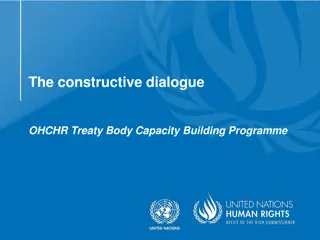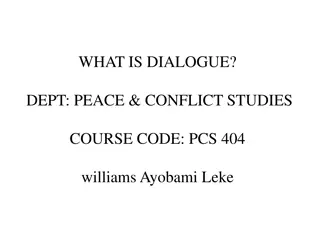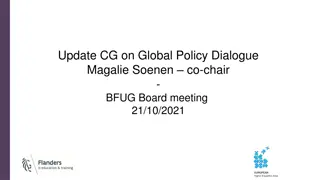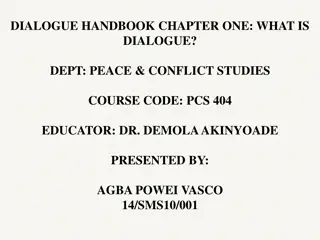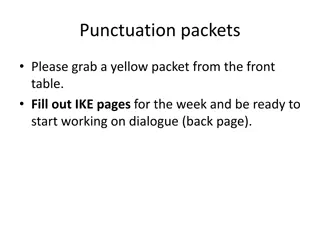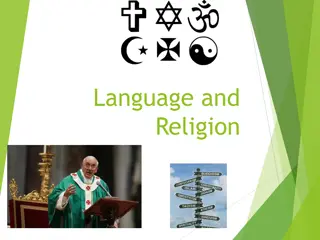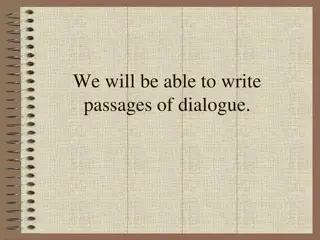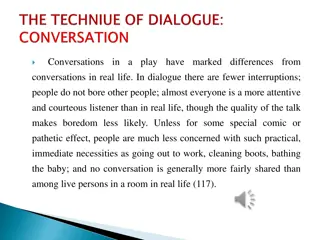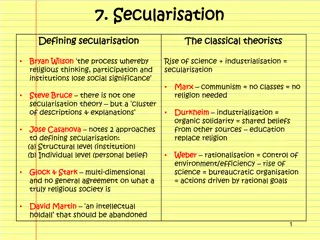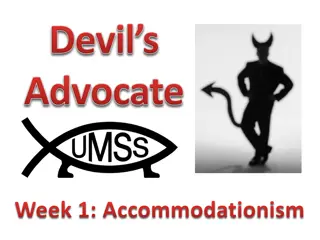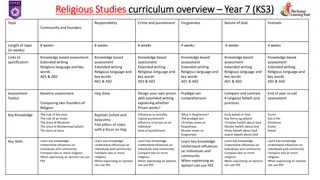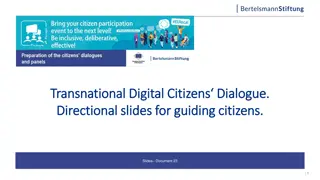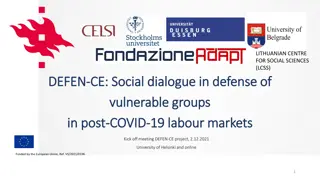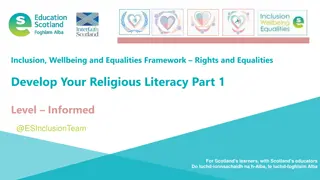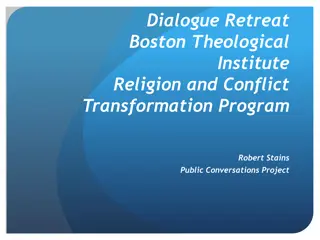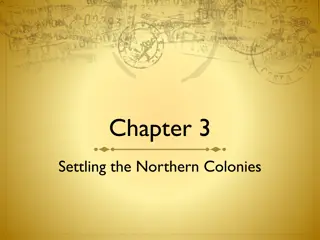Status of Family Laws in India: Hindu vs. Religious Minorities
The family and personal status laws in India vary between Hindu law and those pertaining to religious minorities. While Hindu law has seen extensive reforms, discriminatory provisions still exist. In contrast, laws governing religious minorities have undergone fewer reforms, leading to greater inequ
2 views • 4 slides
Understanding Religious Conflict: Definition and Types Explored
Religious conflict is a complex and recurring concept throughout history. Scholars have defined it as disagreements between religious groups. This conflict arises from contentious issues touching on ideology, morality, power, and identity, influenced by various socio-political, economic, and cultura
1 views • 13 slides
Evolution of Akbar's Religious Policy: A Historical Overview
In the 16th century, Akbar the Great implemented a revolutionary religious policy in the Mughal Empire. Initially a devout Sunni Muslim, Akbar evolved his stance to promote harmony and equality among all religions, fostering tolerance and understanding. This shift marked a significant departure from
1 views • 25 slides
Elizabethan Religious Settlement: Unity Amidst Division
Amid religious division in England, Queen Elizabeth I implemented a Religious Settlement in 1559 to unify the country. The settlement, a blend of Protestant and Catholic elements, aimed to maintain peace and prevent rebellions. Elizabeth's strategic compromise pleased most people, though lingering t
0 views • 14 slides
Understanding Secularism: Principles and Advantages
Secularism is the principle of separating government institutions from religious entities to ensure equal rights for believers and non-believers. It safeguards freedom of religious belief and practice, upholds religious freedom, and promotes democracy and fairness. Secularism aims to prevent religio
0 views • 21 slides
State-Sponsored Interreligious Dialogue in the Middle East: A Political Analysis
This research delves into the growth of state-sponsored interreligious dialogue initiatives in the Middle East between 2000-2020. It explores the political significance, impact on relations between political and religious authorities, and implications for religious practices in the region. The thesi
0 views • 23 slides
Mastering Dialogue in Writing: Essential Rules and Examples
Learn the key rules of using dialogue in writing through examples and explanations. Discover when to use italics or quotation marks, how to handle punctuation and capitalization, when to introduce speakers, and how to add variety to dialogue tags. Get ready to enhance your writing with effective dia
0 views • 6 slides
Understanding Religious Language: Cognitivism vs. Non-Cognitivism in the University Debate
This discussion explores the debate between cognitivism and non-cognitivism in religious language. Cognitivism asserts that religious claims aim to describe the world and can be true or false, while non-cognitivism argues that such claims express attitudes and cannot be verified. Flew's challenge qu
0 views • 9 slides
Understanding the Constructive Dialogue in Human Rights Context
The constructive dialogue is a key component of the OHCHR Treaty Body Capacity Building Programme, assisting treaty bodies in comprehensively assessing the human rights situation of a state party. This process involves various stakeholders, including state delegations and treaty body members, in str
1 views • 9 slides
Understanding Dialogue in Peace and Conflict Studies Course (PCS 404)
In the field of Peace and Conflict Studies, dialogue plays a crucial role in resolving disputes and achieving mutual understanding. This article explores the definition of dialogue, its principles, views, and two types of discussions - destructive and constructive. By understanding the essence of di
0 views • 8 slides
Guide to Using the BSA Calendar of Religious Observances
The BSA Calendar of Religious Observances is a valuable resource for scheduling scouting events in consideration of various religious holidays and observances. This guide provides an overview of the calendar, highlights important dates, and emphasizes the importance of respecting religious diversity
0 views • 8 slides
Mastering Dialogue Punctuation for Realistic Writing
Learn how to properly punctuate dialogue to make your characters' conversations engaging and clear. Understand the rules of punctuating dialogue, including using quotation marks, speaker tags, end marks, and handling interruptions. Enhance your writing by mastering the art of punctuating dialogue re
0 views • 13 slides
Global Policy Dialogue: Enhancing Cooperation and Knowledge Sharing
A comprehensive overview of the set-up and outcomes of the Global Policy Dialogue's kick-off meeting, including the establishment of sub-groups focusing on macro-regions and the development of a work plan for facilitating cooperation and mutual understanding. The umbrella project aims to enhance int
0 views • 6 slides
Dialogue on Appreciation at an Art Exhibition
Two friends, Sakil and Rina, visit an art gallery and admire the paintings together. They engage in a dialogue appreciating the beauty, creativity, and talent showcased in the various artworks. The conversation reflects their admiration and respect for the artists' work, culminating in a heartfelt a
0 views • 8 slides
Insights into Social Economy and Social Dialogue Research Outcomes
Research outcomes from the Mesmer+ project at HIVA KU Leuven reveal misalignments in social dialogue inclusiveness, challenges faced by social economy entities, and the role of employers in the social economy. Recommendations include enhancing the role of social economy employers and promoting inclu
1 views • 7 slides
Understanding the Essence of Dialogue in Peace and Conflict Studies
Dialogue, derived from the Greek term "dialogos," encompasses more than mere conversation. It is a unique form of communication where participants actively seek mutual understanding and deeper insights. Key principles include trust, openness, honesty, and equality. Understanding the nature of dialog
0 views • 11 slides
Enhancing Dialogue Skills Through Mentorship and Practice
Explore the world of dialogue with engaging activities such as filling out IKE pages, practicing conversation between characters, and using various dialogue tags. Dive into character development, emotion, and plot depth with dialogue checklist and interactive practices. Get inspired by well-known li
0 views • 7 slides
Understanding the Role of Language in Religion
Exploring the significance of language in religious contexts, this content discusses the functions, features, lexicon, grammar, and metaphorical aspects present in religious language. It delves into how religious language upholds spiritual beliefs, persuades believers, and expresses specific attitud
0 views • 8 slides
Understanding the Cultural Dimensions of Food and Religious Influences in Culinary Arts
Explore the impact of religious beliefs on food traditions and dietary restrictions across different cultures in the culinary world. Learn about the influence of major world religions on eating habits, food choices, and culinary practices. Discover how various religious groups, such as Christians, o
0 views • 26 slides
Celebrity Interview Dialogue Practice Activity
Practice a dialogue between a celebrity and an interviewer with a partner. Choose a celebrity, fill in details, write an interview, and role-play in front of the class. Follow steps for greetings, introductions, and questions about personal details and interests. Sample dialogue featuring Angelina J
0 views • 4 slides
Enhancing Dialogue Writing Skills for Engaging Narratives
Explore the importance of dialogue in writing and learn how to enrich dialogue passages with narrative descriptions. Dive into the narrative nuances of characters through dialogue interactions, adding depth and vitality to your storytelling. Practice revising punctuation in dialogue and craft your o
1 views • 10 slides
The Vital Role of Religious Institutions in Supporting Immigrants
Religions and immigration are interlinked in modern societies, where religions play a significant role in providing services, defending rights, and supporting the social cohesion of immigrants. Mainstream religious institutions serve as key actors in offering assistance, advocating for migrant right
2 views • 14 slides
Understanding Religious Language: Flew, Hare, Mitchell
Exploring the contrasting views of cognitivism and non-cognitivism in the context of religious language through the perspectives of Flew, Hare, and Mitchell. Delve into Flew's challenge on the undetectable gardener, Hare's concept of bliks, and Mitchell's response to the rationality of religious bel
0 views • 7 slides
Insights into Stage Dialogue and Craftsmanship in Playwriting
Stage dialogue differs from real-life conversations, with a focus on attentive and courteous listening. Stage conventions like asides and set speeches serve to convey inner thoughts and showcase actors' skills. Crafting effective dialogue in plays involves balancing information and aesthetic appeal,
0 views • 5 slides
Religious Accommodation in the Army: Advising Command
The content discusses the role of the Chaplain Corps in advising Soldiers and leaders on religious accommodation in the Army as of February 13, 2019. It covers learning objectives, legal foundations, Army policies, procedures, recent changes, and references related to religious accommodation. The in
0 views • 36 slides
Understanding Religious Discrimination Laws in California Workplace
Learn about the regulations and protections under FEHA and Title VII in California, including religious exemptions, accommodation requirements, case studies, and best practices to address discrimination issues effectively. Discover the statistical insights on religious discrimination complaints and
0 views • 45 slides
Understanding Secularisation: The Decline of Religious Influence in Society
Secularisation refers to the process in which religious thinking, participation, and institutions lose their social significance. This phenomenon is influenced by factors such as the rise of science, industrialisation, changing social attitudes, and the disengagement of the church from society. Evid
0 views • 8 slides
Philosophers' Views on Religious Experience: Insights and Critiques
This lesson delves into the perspectives of various philosophers such as Rudolph Otto, Richard Swinburne, John Hick, and Michael Persinger on religious experiences. It explores concepts like the numinous, religious knowledge, God's existence, and criticisms on the validity of religious experiences.
0 views • 7 slides
Philosophers' Views on Religious Experience: Insights from William James
Explore William James' perspective on religious experiences, including his views on existential and value judgments. Understand how James argued for the validity of religious experiences and their potential proof of God's existence. Delve into the implications of emotions and prior beliefs on interp
0 views • 7 slides
Religious and Social Conflicts Fueling the Rise of Absolutism in Europe
Social, economic, and religious conflicts in Europe played a significant role in the emergence of absolutism where monarchs wielded supreme power without sharing it with legislative bodies. Events like Spain's religious conflicts, Protestantism in England, the Spanish Armada, religious conflict in t
0 views • 10 slides
Religious Pluralism and Civil Society: A Paradox in Government Control
Understanding the intricacies of religious pluralism in the context of government control reveals a paradox where restricting religion can hinder social cohesion and economic growth. Through insights on the counterproductivity of control, the role of religious organizations in civil society, and the
0 views • 16 slides
US Religious Freedom Restoration Act (RFRA) Overview
The US Religious Freedom Restoration Act (RFRA) aims to protect the free exercise of religion by ensuring that governments do not substantially burden religious practices without compelling justification. It emphasizes striking a balance between religious liberty and governmental interests through t
0 views • 9 slides
Understanding Accommodationism in Religious Dialogue
Exploring the concept of accommodationism in religious discourse, this content delves into topics covered at a summit and provides insights on the benefits of dialogue over confrontation. Operational definitions, a case for accommodation/dialogue, and the importance of understanding diverse religiou
0 views • 15 slides
Religious Studies Curriculum Overview for Year 7 and 8 (KS3)
Explore various topics such as responsibility, crime and punishment, forgiveness, nature of God, festivals, community, founders, worship, creation, life after death, rules and laws, relationships in this detailed Year 7 and 8 (KS3) Religious Studies curriculum. The curriculum includes assessments, e
0 views • 6 slides
Transnational Digital Citizens Dialogue Directional Slides
This document contains directional slides for guiding citizens in the Transnational Digital Citizens Dialogue. It includes technical instructions, the dialogue process, chat functions, and welcome messages in multiple languages. Important symbols in Zoom, camera and microphone usage instructions, la
0 views • 13 slides
Social Dialogue in Defense of Vulnerable Groups in Post-COVID-19 Labour Markets
The Lithuanian Centre for Social Sciences (LCSS) is hosting the DEFEN-CE project kickoff meeting at the University of Helsinki, focusing on social dialogue in defense of vulnerable groups in post-COVID-19 labor markets. The project aims to explore the role of social dialogue in addressing employment
0 views • 33 slides
Classroom Role-play Activity: Teacher and Pupils Dialogue
Engage students in a role-playing activity where they act out a classroom dialogue between a teacher and pupils. The activity involves forming groups, choosing roles, writing dialogue, and acting out the scene in front of the class. The teacher's and pupils' roles are defined, with specific instruct
0 views • 4 slides
Developing Religious Literacy for Educators in Scotland
This resource aims to enhance educators' understanding of religious literacy by exploring religious discrimination, core beliefs of major faiths, and additional learning sources. It encourages educators to consider the needs of learners in relation to their religious beliefs in Scotland.
0 views • 30 slides
Exploring Dialogue, Identity, and Conflict Transformation in Religious Settings
This retreat program at the Boston Theological Institute delves into the power of dialogue, identity, and conflict resolution within the realm of religion. Participants engage in exercises, discussions, and reflections aimed at fostering understanding, empathy, and effective communication. The core
0 views • 23 slides
Settling the Northern Colonies: Religious Transformation and Colonization
The Protestant Reformation led to the emergence of Puritanism in the Northern Colonies, with figures like Martin Luther and John Calvin shaping religious beliefs. The Massachusetts Bay Colony stood as a beacon of self-government and religious ideals, while dissenters like Anne Hutchinson and Roger W
0 views • 9 slides





